A Survey of Britain(Revision)
a survey of Britain
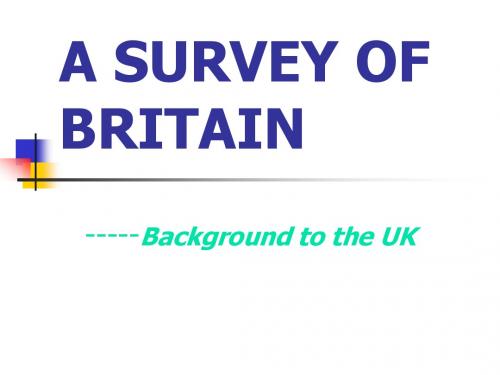
Administration Areas (3)
Wales, on the western prominence between the Bristol Channel and Dee estuary, is the smallest among the three nations, though larger than Northern Ireland.
Administration Areas (2)
Just under 1,000km (about 600 miles) from the south coast to the extreme north of Scotland and just under 500km across at the widest point England occupies the southern portion of Great Britain. It is the most important part of the Kingdom in wealth, size and population.
Administration Areas (3)
Northern Ireland is the smallest of the four nations, both in area and population. With only 1.5 million people, it is smaller than many Chinese cities.
London
It contains the headquarters of the national television networks and of all the national newspaper. It is about 7 times larger than any other city in the country. About a fifth of the total population of the UK lives here. London situates on the northern banal area of 242,000 square kilometers, accounting for less than 2% of the land area of the world
RevisionCountry and Nationality(国家与国籍)

Germa_a_ _n_ 德国的,德国人
问:根据国家与国籍单词拼写的相近特点, 你有什么妙法记忆国家与国籍单词呢?
答:有些是在国家单词后面增加几个字母 变成国籍单词;有些是国家单词和国籍单词 前面相同而后面不同;总之要比较他们的相同 同点和不同点进行记忆。
Read the setence and complete “A”or “B”. ( A ) 1.Janet is from _____.
A. Canada B.Canadian ( B ) 5. A: Where is she _____ ?
B : She is from Germany.
A. with B. from ( A ) 6. We are from ____?
A. Britain B. British
讨论:区别运用国家与国籍单词的妙法是什 么?
Country Nationality
China
Chinese
China Chinese
Australia Australian
Japan
Japanese
American
Germany German
Britain British
Canadian Canadian
(1) Lisa: Where are you _f_ro_m______?
A. America. B. American ( B ) 2. These are _____ stamp .
A. France B. French ( B ) 3. I am _____.
A. China B. Chinese
( B ) 4. This is a ______ toy bike.
外研版2019高中英语选择性必修第一册Unit4 Meeting the Muse Revision

abstract v. 摘要;提取;抽象化;退出;转移;使心不在焉
concrete n.&adj. 混凝土,具体的
in the concrete 实际上,具体的
1. It's also necessary to supply an _a_b_s_tr_a_c_t ____(摘要) of the review of the literature as well.
2. How can faculty improve their teaching ___s_o_a_s_t_o____(为了) encourage creativity? 3. So don't rush to _l_a_b_e_l_ your own life __a_s__ boring. 4. He was so shocked that he could hardly _b_r_i_n_g_o_u_t____(说出) a word. 5. Network language has __g_o_n_e_d_e_e_p_i_n_to____(深入到) the daily life and even started to
2. England, Scotland and Wales _c_o_m__p_o_s_e____(构成) the island of Great Britain.
3. I was so upset that I could hardly _c_o_m__p_o_se__m_y_s_e_l_f ___(镇定下来).
innovation/innovative innovation n. 创新,革新;新方法;innovations (pl.) innovative adj. 革新的,创新的;新颖的;有创新精神的 innovatively adv. 创新地 1. 我们必须提倡独创性,激发创造力,鼓励创新。
度全国英语专业四级试题及答案(8)_0

度全国英语专业四级试题及答案(8)29.答案:A【试题分析】本题为动词词义辨析题。
【详细解答】这句话是说:麦当劳在1966年转向冷冻薯条的制作。
switching to意为“改变”;diverting from/to意为“转移”;modifying 意为“修改”;altering 意为“改动(强调事物本身大小、好坏的变化)”。
故本题A最恰当。
30.答案:D【试题分析】本题考查副词的用法【详细解答】本句译为:然而,这个变化在国家的农业和饮食上产生了深远的影响。
still 意为“仍然”;anyway 意为“无论如何”;besides 意为“除...之外”;nevertheless意为“然而”。
根据上下文,此处需要转折关系的副词,故选项D为正确答案。
31. 答案:C【试题分析】本题考查名词的用法。
【详细解答】brand意为“商标,商品的牌子”;stuff意为“东西”;commodity意为“商品,产品”,故选项C为正确答案。
32. 答案:B【试题分析】本题考查关系代词的用法。
【详细解答】这是考查定语从句的用法,“that”关系代词,指代前面的plants,而A、C、D均无此功能。
33. 答案:D【试题分析】本题考查介词的用法。
【详细解答】介词“of”表示所属关系,本句译为:麦当劳的扩张和低成本、高产量薯条的普及改变了美国人的饮食方式。
34. 答案:A【试题分析】本题为副词用法辨析题。
【详细解答】本句译为:薯条长期受到消费者、竞争者,甚至食品评论家的赞扬。
根据上下文,正确答案为选项A 。
35. 答案:A【试题分析】本题为形容词词义辨析题。
【详细解答】distinctive意为“有特色的,与从不同的”;distinct 意为“清晰的,明白的”;distinguished意为“卓越的,的”;distinguishable 意为“可区别的”。
根据上下文可知选项A为正确答案。
36. 答案:B【试题分析】本题为动词词义辨析题。
BOOK2期末复习unit4背诵版
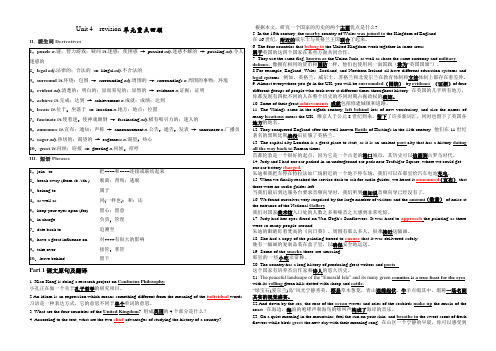
Unit 4 revision单元重点回顾II. 派生词DerivativesIII. 短语PhrasesPart 1课文原句及翻译1. Xiao Kong is doing a research project on Confucius Philosophy.小孔正在做一个关于孔子哲学的研究项目。
2.An idiom is an expression which means something different from the meaning of the individual words. 习语是一种表达方式,它的意思不同于单个单词的意思。
3. What are the four countries of the United Kingdom? 组成英国的4个部分是什么?4. According to the text, what are the two chief advantages of studying the history of a country?根据本文,研究一个国家的历史的两个主要优点是什么?5. In the 16th century, the nearby country of Wales was joined to the Kingdom of England.在16世纪,附近的威尔士与英格兰王国联合了起来。
6.The four countries that belong to the United Kingdom work together in some areas.属于英国的这四个国家在某些方面共同合作。
7. They use the same flag, known as the Union Jack, as well as share the same currency and military defence. 像拥有相同的货币和国防一样,他们也使用同一面国旗(称为“英国国旗”)。
A Brief Survey of the UK-2

Some hundreds of small islands
3. Geographical features
An island country in north Atlantic Ocean, off the north coast of Europe, separated from the main continent of Europe by the English Channel in the south and the North Sea in the east.
3. Transition to the Modern Age (1455-1688)
(1) (2) (3) (4) (5) (6) The Wars of the Roses (1455-1485) The English Reformation Elizabeth I (1533-1603) The English Renaissance Britain under James I (1566-1625) Charles I (1600-1649) and the Par.; The Civil Wars (1642-1651) (7) Establishment of the Commonwealth (1649-1660) (8) The Restoration and the Glorious Revolution of 1688
4. Rivers and Lakes
the Severn the longest river the Thames the Thames the best known river on which London stands
the Lough Neagh the Lake District
鲁教版八年级英语上册课件Unit 2
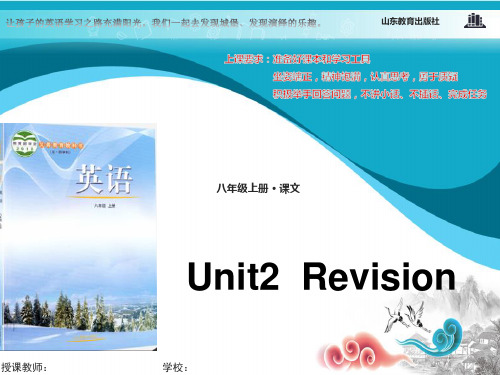
常见考题:
1.Autumn,a British English word,is called f_a_ll__ in American English. 2. 3.The Greens are now in Canada on v_a_ca_t_io_n__(假期). 4.In the USA people go to cinemas when they want to see m_o_v_ie_s___. 5.Rubber is another way of saying e__r_a_s__e_r_.
P26
1.有最多/少的学生have the most / feweststudents 2.玩电脑游戏 play computer games
3.另外的半小时下象棋
another half an hour for playing chess
4.有半小时从事我的爱好
have half an hour for my hobbies 5. 最多 / 至少 at most / at least 6. 阅读、读书 do some reading
2.一所混合学校 a mixed school
3. 在我所有的科目中 among all my subjects
4.与…讨论
discuss…with/ have discussion with sb.
a
5.从…借来… borrow… from…
把某物借给某人lend sb sth / lend sth to sb.
9. We should keep_q_u_ie_t(quiet) when we have a meeting.
10. It is raining_h_e_a_v_ily(heavy) outside; you must take your raincoat.
英语国家(中英文对照)简介

Land and People 英国的国土与人民I. Different Names for Britain and its Parts 英国的不同名称及其各组成部分1.Geographical names: the British Isles, Great Britain and England.地理名称:不列颠群岛,大不列颠和英格兰。
2.Official name: the United Kingdom of Great Britain and Northern Ireland.官方正式名称:大不列颠及北爱尔兰联合王国。
3.The British Isles are made up of two large islands-Great Britain (the larger one) and I reland, and hundreds of small ones.不列颠群岛由两个大岛—大不列颠岛(较大的一个)和爱尔兰岛,及成千上万个小岛组成。
4.Three political divisions on the island of Great Britain: England, Scotland and Wales.大不列颠岛上有三个政治区:英格兰、苏格兰和威尔士。
(1) England is in the southern part of Great Britain. It is the largest, most populous sect ion.英格兰位于大不列颠岛南部,是最大,人口最稠密的地区。
(2) Scotland is in the north of Great Britain. It has three natural zones (the Highlands i n the north; the Central lowlands; the south Uplands) Capital: Edinburgh苏格兰位于大不列颠的北部。
同等学力申硕词汇练习

5. They provide a means of keeping ___ of the thousands of journal papers that are published monthly or quarterly. A. tract B. contact C. relation D. steps 6.You can use the Course Calendar to help ___your students of important dates in the course, such as test dates. warn B. remind C. convince D. deprive A。keep track of sb/sth意为“与…保持联系,跟踪”。keep contact/relation一般后面接with,意为“与…保持联系”;keep steps 后也接with,意为“与…步伐一致”。 B
9. In spite of a problem with the faulty equipment, some very useful work was accomplished. A. imperfect B. temporary C. emergency D. reinstalled 10.Bob believes that invasion of the marketplace into the university is undermining fundamental academic values, and that we must act now to halt this decline. lace B. plug C. cease D. digest A reinstalled:重新设置 C lace: 系紧
综合英语试题
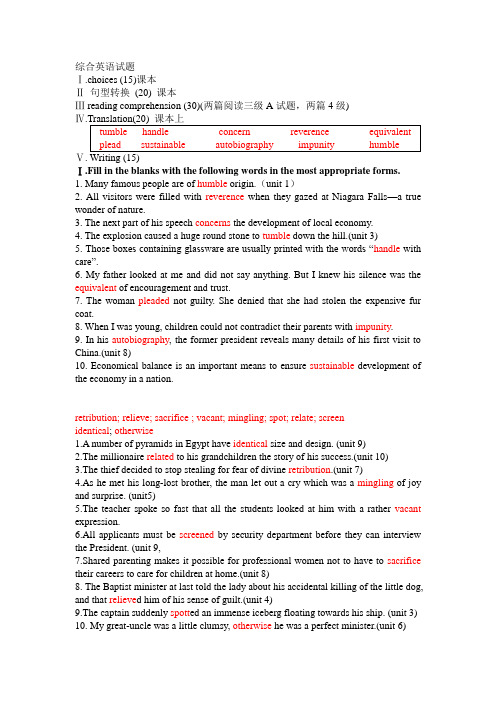
综合英语试题Ⅰ.choices (15)课本Ⅱ句型转换(20) 课本Ⅲ reading comprehension (30)(两篇阅读三级A试题,两篇4级)ⅣⅤⅠ.Fill in the blanks with the following words in the most appropriate forms.1. Many famous people are of humble origin.(unit 1)2. All visitors were filled with reverence when they gazed at Niagara Falls—a true wonder of nature.3. The next part of his speech concerns the development of local economy.4. The explosion caused a huge round stone to tumble down the hill.(unit 3)5. Those boxes containing glassware are usually printed with the words “handle with care”.6. My father looked at me and did not say anything. But I knew his silence was the equivalent of encouragement and trust.7. The woman pleaded not guilty. She denied that she had stolen the expensive fur coat.8. When I was young, children could not contradict their parents with impunity.9. In his autobiography, the former president reveals many details of his first visit to China.(unit 8)10. Economical balance is an important means to ensure sustainable development of the economy in a nation.retribution; relieve; sacrifice ; vacant; mingling; spot; relate; screenidentical; otherwise1.A number of pyramids in Egypt have identical size and design. (unit 9)2.The millionaire related to his grandchildren the story of his success.(unit 10)3.The thief decided to stop stealing for fear of divine retribution.(unit 7)4.As he met his long-lost brother, the man let out a cry which was a mingling of joy and surprise. (unit5)5.The teacher spoke so fast that all the students looked at him with a rather vacant expression.6.All applicants must be screened by security department before they can interview the President. (unit 9,7.Shared parenting makes it possible for professional women not to have to sacrifice their careers to care for children at home.(unit 8)8. The Baptist minister at last told the lady about his accidental killing of the little dog, and that relieve d him of his sense of guilt.(unit 4)9.The captain suddenly spott ed an immense iceberg floating towards his ship. (unit 3)10. My great-uncle was a little clumsy, otherwise he was a perfect minister.(unit 6)Ⅱ. Rewrite the following sentences using the given expressions.Run out of something, be devoid of, make one‟s way to, in the wrong, bits and pieces, Roar with laughter, retire from, come up, for the sake of, in conflict with.1. Since his assistant has taken over all the work, the old manager will soon stop doing his job.2. A teacher is different from an actor in that he must be ready to handle any unexpected problems which might arise in the classroom.(unit 4)3. I realize that it is my fault.4. Automobiles are subjected to an annual inspection for the purpose of traffic safety.(unit 6)5.With reform and opening-up policy, China is advancing towards prosperity.(unit 11)6. My nephew always uses up his pocket money before the end of each month.7. Those who treat poor people coldly lack human sympathy.unit 138. In a slip of the tongue, the speaker said in his opening remarks “Good ladies, morning and gentlemen.” The audience laughed hilariously.(unit 3)9.The carpenter could only find some small things to do in the basement.10.His suggestion was novel to us. And it was completely the opposite of the conventional idea.above all; to such an extent; above all; react to ;hinge onfall into ;refer to; all but; might as well; resound with1.In “Transforming Mars”, the recommended program is divided into five stages. (fall into)(unit9)2. I chose the car for its speed, comfort, and most important, for its reliability.()(unit 1)3. I don‟t know which companies she was talking about when se spoke of competing firms. (referring to) (unit 10)4. With restrictive bindings applied to my knees, I was clumsy to such a degree that I could only hobble along.(unit 5)(to such an extent)5.Since you have to pass the exam, you had better do some revision.(unit 6)(might as well)6.When it reached home for help, the dog was almost dead from the exhaustion.(unit 12, all but)7.The boy responded to his teacher‟s criticism by turning his back on the teacher. (unit 10, react to)8. The girl is waiting for her boyfriend‟s call in such an anxiety that it seems as if her fate depended totally on the ringing.(unit 8, hinge on)9.Auto-manufactures suggest that solar energy could be used instead of petrol.(unit 4, an alternative to)10. The woods behind our house were filled with birds‟twittering in the early morning.()(unit 11)Ⅲ.Reading ComprehensionDirection: There are 4 passages in this part. Each passage is followed by some questions or unfinished statements. For each of them there are four choices marked A),B), C) and D). You should choose the best choice and mark the corresponding letter on the Answer Sheet with a single line through the center.Most people buy a lot of gifts just before Christmas. But some people think they buy too much. They have started a special day called Buy Nothing Day. They don‟t want anyone to go shopping on that day.Buy Nothing Day is November 29. It‟s 25 days before Christmas. The idea for Buy Nothing Day started in Vancouver, British Columbia. Now people all over the United States celebrate Buy Nothing Day. In California, parents and children get together to read stories, sing songs and paint pictures. The children talk about why they don‟t need a lot of toys.This year in Albuquerque, New Mexico high school students wanted to tell other students about Buy Nothing Day. They organized a simple dinner to give people information about Buy Nothing Day. They asked restaurants in the neighborhood to donate(赠送) and talked to other students about it. The dinner was a big success, and many students agreed not to buy anything on November 29. the students at he high school liked the idea of this new tradition. Next year, they want to have another dinner to inform more people about Buy Nothing Day!36. Some people start Buy Nothing Day because they think___.A. people need more time to do other thingsB. people buy to many gifts for ChristmasC. people can hardly afford to buy a lot of giftsD. people waste too much time going shopping37. The idea for Buying Nothing Day first started in____A. California.B.Albuquerque.C. British ColumbiaD. New Mexico38.To make Buying Nothing Day more popular, the students in Albuquerque plan to ___A. Provide free food to more people.B. persuade more restaurants to donate food.C. put up more advertising posters on that day.D. have another dinner to inform more people of the Day.39. According to passage, which of the following statements is TRUE?A. Buy Nothing Day has become popular in the United States.B. Restaurants have a tradition of donating food on holidays.C. Gift shops are expected to be closed on Buy Nothing Day.D. Children like the idea of Buy Nothing Day best.40. The best title for the passage might be___A.Buy Nothing Day in the U.S.B. The Future of Buy Nothing DayC. Free Dinners on Buy Nothing DayD. Students‟ Activities on Buy Nothing Day (三级B, answer:BCDAA)(三级B)Unlike Britain, the US does not have a national health care service. The government does help pay for some medical care for people who are on low incomes and for old people, but most people buy insurance(保险) to help pay for medical care. the problems of those who cannot afford insurance are an important political subject.In Britain, when people are ill, they usually go to a family doctor first. However, people in America sometimes go straight to an expert without seeing their family doctor first. Children are usually taken to a doctor who is an expert in treatment(治疗) of children. In Britain, if a patient needs to see a specialist doctor, their family doctor will usually recommend a specialist.Doctors do not go to people‟s homes when they are ill. People always make an appointment to see the doctor in the doctor‟s office. In a serious situation, people call for an ambulance(救护车). The government will then help pay for some of the cost of the medical care.36. Some medical care is paid by the U.S. government for___A. people living in the countryB. non-government officialsC. people with insuranceD. the poor and the old37. Most people in the U.S. buy insurance__A.to pay for their own medical careB . to help to live o their low incomesC. to improve the national health care serviceD. to serve one of the important political problems38.What do British people usually do when they are ill?A. They go to see their family doctor firstB. They go to see a specialist firstC. They call for a specialist doctorD. They call for a family doctor.39.In America, seriously ill patients will___A. be treated if they have an insuranceB. make an appointment with a specialist onlyC. receive treatment even without insuranceD. normally go to see an expert for treatment40. Which of the following would be the best title for this passage?A. Types of Doctors in the U.S. and BritainB. Health Care in the U.S. and BritainC. Treatment of Sick Children in the U.SD. Medical Insurance in the U.S. and Britain (三级B:D,A,A,C,B)Passage 1 ( 已核对)The economy of the United states after 1952 was the economy of a well-fed,almost fully employed people. Despite occasional alarms, the country escaped any postwar depression and lived in a state of boom. An economic survey of the year 1955, a typical year of the 1950‟s, may be typical as illustrating the rapid economic growth of the decade. The national output was value at 10 percent above that of 1954 (1955 output was estimated at 392 billion dollars). The production of manufacturers was about 40 percent more than it had averaged in the years immediately following World War 2. The country‟s business spent about 30billion dollars for new factories and machinery. National income available for spending was almost a third greater than it had been it had been in 1950. Consumers spent about 256 billion dollars; that is about 700 million dollars a day ,or about twenty-five million dollars every hour ,all round the clock。
Revision(寒)
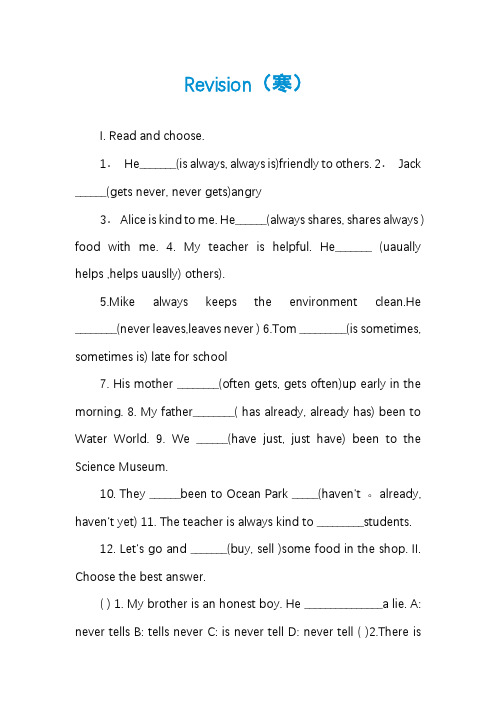
Revision(寒)I. Read and choose.1.He_______(is always, always is)friendly to others. 2.Jack ______(gets never, never gets)angry3.Alice is kind to me. He______(always shares, shares always ) food with me. 4. My teacher is helpful. He_______ (uaually helps ,helps uauslly) others).5.Mike always keeps the environment clean.He ________(never leaves,leaves never )6.Tom _________(is sometimes, sometimes is) late for school7. His mother ________(often gets, gets often)up early in the morning. 8. My father________( has already, already has) been to Water World. 9. We ______(have just, just have) been to the Science Museum.10. They ______been to Ocean Park _____(haven't 。
already, haven’t yet) 11. The teacher is always kind to _________students.12. Let’s go and _______(buy, sell )some food in the shop. II. Choose the best answer.( ) 1. My brother is an honest boy. He _______________a lie. A: never tells B: tells never C: is never tell D: never tell ( )2.There issome rubbish on the beach. Let’s ________________. A: find it out B: find out C: pick it up D: pick up it ( ) 3. She has a bad habit. That’s she ______ her exercise books at home. A. is always leave B. always leaves C. leaves always D. leave always ( ) 4. The boys ________ basketball in the afternoon.A. sometimes playB. play sometimesC. play soometimesD. plays sometimes ( ) 5. Our teacher _____ always busy and he never _____ kites with the students.A. is, flyA. to haveB. are, flies B. havingC. is, flies C. have C. buyingD. are, fly D. had( ) 6. Jack and his friends plan _____ dinner together. ( ) 7. My aunt promises ______ a new computer for me.A. to buyB. buyD. buys( ) 8. I like Beijing very much and I _________ there 3times.A. have already goneB.already have beenC. already have goneD. have already been ( )9. Ben is Peter’s friend and they like __________ football together.A. playsB. playC. playedD. to play( )10. The English book is in your bag. Please _______.A. take it outB. take out itC. find it outD. find out it ( )11. We can get much _______from the Internet(网上).A. milkB. breadC. waterD. information ( )12. Mary would like to be a shop assistant because she wants to _______things to people. A. buy B. sell C. buys D. sellsIII. Rewrite the sentences according to the instructions in the brackets. (根据要求改写句子)1. Jack has some black pens. (否定句)Jack _____ _____black pens.2. His father usually has lunch at factory. (一般问句)_____his father usually _____lunch at factory?3. The children often have sports on the playground in the afternoon.(否定句)The children _____ often ______sports on the playground in the afternoon. 4. Alice has just gone to Beijing. (一般问句) _____Alice gone to Beijing______?5. They have already made some birthday cards. (否定句)They _____ made ______birthday cards ______. 6. My parents like me ver much. (一般问句)______ your parents ______ _____very much?7. The students of Class Three had class meeting yesterday afternoon.(划线提问)_____ _____the students of Class Three _____ class meeting? 8. They have been to the Science Musum. (划线提问)______ _____they been ?9. Kitty’s mother always takes underground to go to work.(同意句) Kitty’s mother _______to work _____ _______.10. Tom’s father sometimes rides bicycle to go to work. (同意句) Tom’s father sometime s ______ to work _____ ______. 11. Petty’ cousin often walks to school. (同意句)Petty’ cousin often ______ to school ______ ______. 12. Mr. Wang never takes plane to travel. (同意句) Mr. Wang never _______ ______ ______.13. I shall/will clean my room tomorrow.(用be going to改写) I __________________ my room tomorrow.14. Jack and Milk will finish their homework in two hours. (用be going to改写) Jack and Milk______________ their homework intwo hours. IV. Reading comprehension(阅读理解)On the night of February 14, I heard there was a lantern show in a park because it was the Lantern Festival. So I went to see it with my mother. We left home after the dinner and got there at about half past seven. We bought three tickets, then we went into the park.In the park, there were many children. We saw many different kinds of lanterns. They were all very beautiful. Some of them were on the trees, and the roads were well lit.The first lantern I saw was a peacock lantern. It was very big. The bird’s head coul d shake and its tail could spread like a fan. It was the most beautiful lantern of all.Behind the peacock there was a boat lantern. It was bigger than any other lanterns in the park. There were three decks on the boat. Many ornaments were decorated on it. It looked so special. Then we went on and saw a lot of other lanterns. All of them were very nice. We had a good time in the park.Answer the questions according to passage.1. What time did they get to the park? They got to the park _____________________.2. Which lantern was the most beautiful?______________ lantern was the most beautiful one. 3. Whichlantern was the biggest one of all?______________ lantern was the biggest one.4. How many decks were there on that boat? There were _______________.5. Did they have a good time in the park? ________________.IV. Reading comprehension(阅读理解) (A)The Smiths are Americans. They are now in Beijing. This is their first visit to China. They are going to stay in China for two months. They want to visit some cities and villages(村庄). They hope to learn some Chinese, too.Mr. Smith is a doctor. He will visit a hospital in Shanghai. Mrs. Smith is a schoolteacher. She is going to visit some city schools and village schools. Their daughter is a middle school student. She wants to meet some Chinese students.They are going to take a lot of pictures in China. When they are back in America, they will show the pictures to their American friends. They want the American people to know more about China.True or False:( )1. The Smiths come from China.( )2. There are three people in Smith’s family. ( )3. They visitChina for the first time.( )4. They plan to stay in China for fourteen days.( )5. Mrs. Smith will visit both some city schools and some village schools.1( )6. The purpose(目的) of taking a lot of pictures is to let American friends know more aboutChina.( )7. This passage mainly talks about “Living in Beijing”. (B)In Britain, cars, buses and bikes must keep to the left side of the street. If a person wants to cross a street, he must be very careful. Before he crosses a street, he has to stop and look to the right first and then the left. While in China, we look to the left first instead.When visitors are in London, they should learn how to take busses and underground trains. The most important of all, they must know in which direction they are going and which bus and which underground train they should take. At the bus top they should wait for their buses to come. As soon as they get on a bus, they must pay for their fares. True or false. (根据文章,判断句子的正误)( ) 1. In England, vehicles(车辆) go along the right side of thestreet.( ) 2. When they want to cross a street, people in England do not look to the left first. ( ) 3. Visitors in London should learn how to take taxis.( ) 4. When in London, visitors must make sure in which direction it is going. ( ) 5. Visitors have to pay for their tickets before they get on a bus. (C)Two young men went on a No. 40 bus on Nanjing Road and each bought a five-fen ticket with a 10-yuan not. They did again when a further fare was required. They stayed in on the same bus for the return trip, for a third time they again took out 10-yuan notes and this time started a quarrel when the conductor had no change. They were then arrested, according to Xinmin Evening News. Answer the questions. (读文章并回答问题)1. Which city did the story happen in?___________________________________________ 2. Where did people get to know the story?___________________________________________3. For what did the two young men stay on the same bus?___________________________________________ 4. Did the two young men enjoy the trip on the bus?___________________________________________ 5. When did the quarrel(争吵)start?When the conductor___________________________________________Choose the words or expressions and complete the passage.(选择最恰当的单词或词组,完成短文) ( D1)I am___1__English boy. My name is Mike. I am twelve. My sister’s name is Ann and we are students. My mother is a teacher. She____2___Chinese in a middle school. My ___3__name is Jim. He’s five. Our father isn’t here. He’s __4___Xinjiang. __5__us are very happy in our family. ( )1. A. a B. an C. the D./( )2.A. teach B.taught C.teaching D.teaches ( )3.A.brother B..brothers C.brother’s D.brother’s ( )4.A.on B.in C. at D.for( )5.A.All of B.Both C.All D.Both of (D2)The Spring Festival(春节)is the Chinese New Years’ Day. It usually comes________February. Everyone in China___2___the Spring Festival very much. When the Spring Festival comes, Li Hong usually helps his parents clean their houst and__3__some shopping and other housework. On that day everyone in China eats dumplings, New Tear’s cakes, and other good food.Li Hong likes New Year’s cakes. But Wang Hai says dumplings are_4_____than New Yrar.s cakes, The Chinese people eat the New Year’s cakes and dumplings in their houses. How ____5__ they are? ( )1.A. after B.on C..in D.by ( )2.A.has B.like C.remembers D. likes ( )3.A.buys B.does C. goes D.carries ( )4.A.smaller B.better C. bigger D.carries ( )5.A.happy B.delicious C. lovely D.great Read the passage and fill in the blanks with proper words.(在空格处填上适当的单词,补全短文) ( E1)The summer holiday is c . My parents p to visit Hainan Island during the holiday. They tell me we will s a 7-day holiday on Hainan Island. Hainan Island is in the s of China. It is f away from my hometown. So I hope we can go there byp because it is fast and comfortable. There are many beautiful beaches there. At the beach, we can make s and play ball games. (E2)Peter is a primary school pupil. He is a g____1____ boy. Uncle John lives next to him. Uncle John has no c_____2___ and he can’t see anythi ng. He w___3_____ in the factory near Peter’s school. He goes to work at 7:30 in the morning and comes home at 4:30 in the afternoon.Peter goes to school at 8:00 in the morning and comes home at the same time as Uncle John in the afternoon. On weekdaysPeter gets up e____4____ to take Uncle John to the factory. A____5____ school he takes Uncle John home. On Sundays Peter helps Uncle John clean the house and do some c_____6___ for lunch. Uncle John thanks Peter very much. He says, “Peter is a good boy. He is l____7____ my son.”。
KB与校内教材(人教)对照

Myself
My body
My Food
Revision My pet My clothes My birthday Revision My School My Classes After School Activities Revision My home My family Family Activities Revision
√
KB1-Unit12 KB2-Unit16
— ——
√ KB1-Unit5
√ KB1-Unit8
√ KB2-Unit11
— ——
√ KB2-Unit2
√ KB2-Unit2
√ KB2-Unit10
— ——
√ KB1-Unit11
√ KB2-Unit5
√ KB2-Unit5
— ——
KB对应
级别与单元
Unit 1 Unit 2 Unit 3 Unit 4
主题 无
Around the World World of animals —— Back to school Exploring our world Tomorrow's world ——
新起点词汇
年级
词汇
1 book
1 ruler
1 pencil
1 eraser
1 pencil case
1 backpack
2 policeman
2 doctor
2 teacher 2 engineer 2 classmate 2 friend 2 big 2 thin 2 pretty 2 ugly 2 tall 2 short 2 from 2 China 2 America 2 Canada 2 Britain 2 park 2 hill 2 lake 2 bridge 2 tree 2 grass 2 flower 2 bee 2 butterfly 2 bench
revision
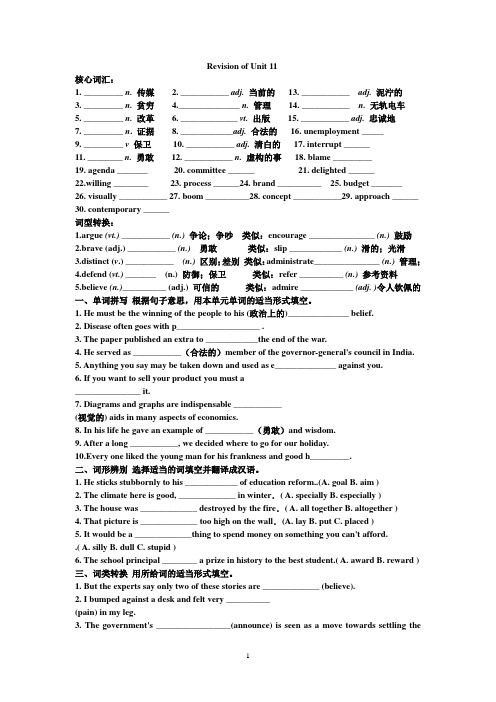
Revision of Unit 11核心词汇:1. _________ n. 传媒2. ___________ adj.当前的13. ___________ adj. 泥泞的3. _________ n.贫穷4.______________ n.管理14. ___________ n.无轨电车5. _________ n.改革6. _____________ vt. 出版15. ___________ adj.忠诚地7. _________ n. 证据8. ____________adj.合法的16. unemployment _____9. _________ v 保卫10. ___________ adj.清白的17. interrupt ______11. ________ n.勇敢12. ___________ n. 虚构的事18. blame _________19. agenda _______ 20. committee ______21. delighted ______22.willing ________23. process ______24. brand __________25. budget _______ 26. visually ___________ 27. boom __________28. concept ___________29. approach ______ 30. contemporary ______词型转换:1.argue (vt.) ___________ (n.)争论;争吵类似:encourage _______________ (n.)鼓励2.brave (adj.) ___________ (n.)勇敢类似:slip ____________ (n.)滑的;光滑3.distinct (v.) ___________ (n.)区别;差别类似:administrate_______________ (n.)管理;4.defend (vt.) _______ (n.) 防御;保卫类似:refer __________ (n.) 参考资料5.believe (n.)__________ (adj.) 可信的类似:admire ____________ (adj. )令人钦佩的一、单词拼写根据句子意思,用本单元单词的适当形式填空。
Revision
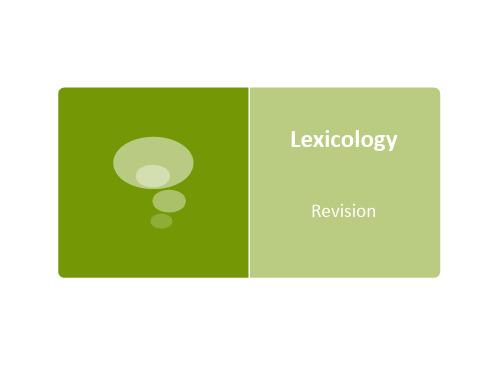
classified into perfect homonyms, homographs and h_________.
Question Types
▪ Part III 填空题 (30%, 1 point each)
English?
▪ What are the fundamental differences between the vocabularies of the three
periods of development?
▪ What are the major and minor linguistic influences on English with regard to
▪ Part IV 分析翻译题 (10%, 1 point each)
Directions: Pick out the words which you think are converted in the following sentences and explain how they are converted. Then translate the following sentences into Chinese.
from the box and using them in their proper forms. Put your answers on the answer sheet.
Example: Success is _________ on how hard you work.
Question Types
Lexicology
英语国家社会与文化第四版上册第七章翻译
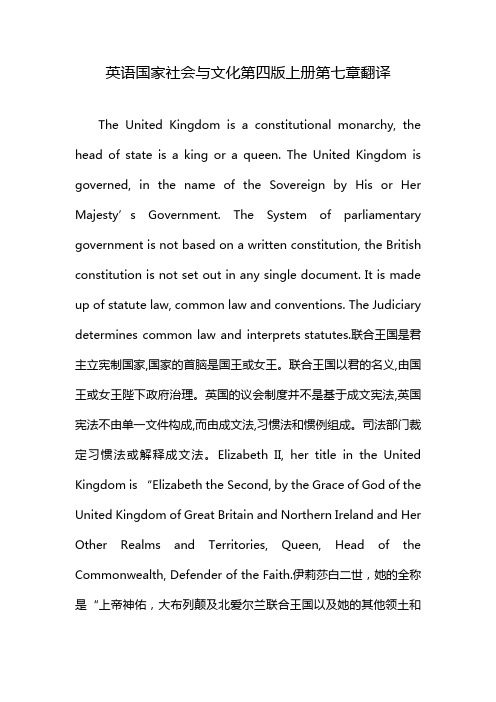
英语国家社会与文化第四版上册第七章翻译The United Kingdom is a constitutional monarchy, the head of state is a king or a queen. The United Kingdom is governed, in the name of the Sovereign by His or Her Majesty’s Government. The System of parliamentary government is not based on a written constitution, the British constitution is not set out in any single document. It is made up of statute law, common law and conventions. The Judiciary determines common law and interprets statutes.联合王国是君主立宪制国家,国家的首脑是国王或女王。
联合王国以君的名义,由国王或女王陛下政府治理。
英国的议会制度并不是基于成文宪法,英国宪法不由单一文件构成,而由成文法,习惯法和惯例组成。
司法部门裁定习惯法或解释成文法。
Elizabeth II, her title in the United Kingdom is “Elizabeth the Second, by the Grace of God of the United Kingdom of Great Britain and Northern Ireland and Her Other Realms and Territories, Queen, Head of the Commonwealth, Defender of the Faith.伊莉莎白二世,她的全称是“上帝神佑,大布列颠及北爱尔兰联合王国以及她的其他领土和领地的女王,英联邦元首,国教保护者伊莉莎白二世。
survey of Britain-推荐下载
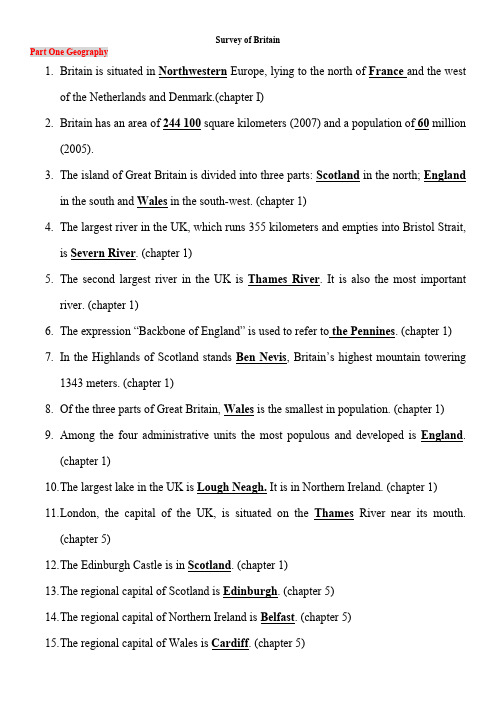
Part One Geography1.Britain is situated in Northwestern Europe, lying to the north of France and the westof the Netherlands and Denmark.(chapter I)2.Britain has an area of 244 100 square kilometers (2007) and a population of 60 million(2005).3.The island of Great Britain is divided into three parts: Scotland in the north; Englandin the south and Wales in the south-west. (chapter 1)4.The largest river in the UK, which runs 355 kilometers and empties into Bristol Strait,is Severn River. (chapter 1)5.The second largest river in the UK is Thames River. It is also the most importantriver. (chapter 1)6.The expression “Backbone of England” is used to refer to the Pennines. (chapter 1)7.In the Highlands of Scotland stands Ben Nevis, Britain’s highest mountain towering1343 meters. (chapter 1)8.Of the three parts of Great Britain, Wales is the smallest in population. (chapter 1)9.Among the four administrative units the most populous and developed is England.(chapter 1)10.The largest lake in the UK is Lough Neagh. It is in Northern Ireland. (chapter 1)11.London, the capital of the UK, is situated on the Thames River near its mouth.(chapter 5)12.The Edinburgh Castle is in Scotland. (chapter 1)13.The regional capital of Scotland is Edinburgh. (chapter 5)14.The regional capital of Northern Ireland is Belfast. (chapter 5)15.The regional capital of Wales is Cardiff. (chapter 5)16.The second largest city in England, Birmingham, is a metropolitan district and anindustrial an manufacturing city. (chapter 5)17.Liverpool is the second largest seaport in England. (chapter 5)18.Manchester is an industrial and commercial center. (chapter 5)19.Britain has a maritime (temperate) climate but changeable weather. (chapter 1)20.British lead ores contain silver. (chapter 2)21.The natural gas was discovered in the North Sea in 1964-1966. (chapter 2)22.Oil deposits were discovered in the North Sea in 1970. (chapter 2)23.Britain is one of the world’s most advanced manufacturing and trading nations.(chapter 3)24.The Silicon Glen between Glasgow and Edinburgh in Scotland is a center of theelectronics industry. (chapter 3)25.Animal husbandry predominates in the farming economy. (chapter 3)26.The population of Britain is made up of the English, the Scottish, the Welsh and theIrish. (Chapter 4)27.The pattern of foreign trade in Britain is a deficit in visible trade and a surplus ininvisible trade. (Chapter 3)28.The Bank of England is the centre of British financial system.29.The major economic problems in Britain are an adverse payments balance andinflation. (Chapter 3)30.The Iberians are the first invaders while the Normans are the last invaders. (Chapter 4) Part Two HistoryChapter I Pre-feudal Society1.The very first known settlers of Britain were the Iberians from the Mediterranean lands.2.From about 750 B.C., the Celtic tribes from Europe settled in Britain. From about 500B.C., Britons from which the modern Welsh are mainly descended came to Britain.3.Between 55 B.C. and 54 B.C. Julius Caesar, a Roman General, invaded Britain twice butfailed to occupy England.4.British recorded history begins with the Roman invasion.5.The Roman occupation lasted for about 350 years.6.With the occupation of Romans, some of the British native people became slaves of theRomans; true slave society was introduced into England.7.From about the middle of the 5th century, the Germanic tribes: the Angles, Saxons andJutes began to invade Britain. And they form the basis of the modern English race and English language.8.By the end of the 7th century, England was divided into seven kingdoms and thereforecalled the Heptarchy.9.In 829 Wessex won the overlordship of all the rest kingdoms, and Egbert, the King ofWessex, began to style himself “King of the English”.10.In the late 6th century Christianity was introduced into England. The head of the Churchwas the Archbishop of Canterbury.11.Bede was a great historian during Anglo-Saxon Times, whose “Ecclesiastical History ofthe English People” (英国人基督教会史) is still of great value.12.Around the turn of the 8th century, northern warriors, called the Vikings invaded England,but the main body came from Denmark and was called the Danes.13.King Alfred of Wessex as lord of all the English fought against Danes. He also built anaval force and later became known as “the Father of the British Navy”.14.During the Anglo-Saxon Times the social system advanced towards feudalism.Chapter II The Growth of Feudalism15.In 1042, after the death of Hardecanute, Edward, known as the Confessor for hisreputation for saintliness, became English King.16.On Christmas Day 1066 Duke William known in history as William the Conqueror wascrowned in Westminster Abbey.17.The Norman Conquest caused important consequences. It increased the process offeudalism which had begun during Anglo-Saxon times.18.In 1086 William the Conqueror had his officials go through England and make a generalsurvey of the land, known as the Domesday Book (i.e. Doomsday).19.Along with the Normans came the French language which would be the language of thecourt and upper classes until the 14th century.20.Henry Plantagenet, in 1154, established the House of Plantagenet (or Angevin) as HenryII.21.In 1215, King John was forced to sign the famous document in British history, MagnaCarta, also called the Great Charter, which was essentially a feudal document.22.The English Parliament originated in the Great Council.23.In 1265, Simon de Montfort called for the first parliament in British history, known as“All Estates Parliament”, which is considered the “beginning of parliament”.24.The “All Estates Parliament” of 1295 has been known in history as the “ModelParliament”.Chapter III The Decline of Feudalism in England25.The Hundred Years’ War refers to the war between Britain and France from 1337 to1453.26.Feudalism in England began to decline in the early 14th century. A natural economygradually gave way to a money economy.27.Black Death swept through England in the summer of 1348. It killed one half of thepopulation and caused a shortage of labor.28.John Wycliffe and his followers, known as Lollards, provided ideological preparation forthe labor movement of the 14th century.29.In 1381, under the leadership of Wat Tyler, the rising of the English peasants took place,after which serfs became either free peasants or wage labourers.30.The Wars of the Roses were fought between the family of Lancaster and the family ofYork, which was a feudal civil war.31.The Wars of the Roses lasted for 30 years and ended in 1485 with the accession of HenryTudor as Henry VII, the founder of the House of Tudor.Chapter IV Growth of Capitalism and the Rule of the Tudors.32.During the Enclosure Movement, “Sheep-devouring-men Movement”, a lot of arablefarms were turned into pastures for sheep-raising.33.In the reign of the Tudors, the other two forms of primitive accumulation were foreigntrade and colonial plunder, including the slave trade.34.In the 16th century Francis Drake and John Hawkins were the most well-known Britishnavigat ors.35.In 1600, the East India Company, the most famous Chartered Company, was formed in India.36.The external pretext for the Reformation of the 16th century was the divorce case of Henry VIII.37.In 1534 Parliament passed the “Act of Supremacy” according to which Henry was declared the head of the EnglishChurch.38.After the Reformation, the Roman Catholic Church was international; the English Church was strictly national.39.In 1558, Elizabeth I became Queen, who was the last ruler of the House of Tudor.40.Renaissance means rebirth—Europe rediscovering its origins in the cultures of ancient Greek and Rome. It was acultural movement.41.The greatest English humanist was Thomas More, and his work Utopia became a humanistic classic in the world’sliterature.42.The greatest dramatist of the Renaissance Times was William Shakespeare.Chapter V The Bourgeois Revolution43.When Elizabeth I died childless in 1603, James VI of Scotland, descended from a sister of Henry VIII, was heir to theEnglish throne, and became James I of England. He insisted on the Divine Right of Kings.44.Upon the death of James I in 1625, Charles I ascended the throne.45.In the British Civil War, the supporters of Parliament were called Roundheads and the supporters of the King werecalled Cavaliers or Royalists.46.Cromwell’s new army was called the New Model Army, chiefly composed of peasants.47.In January 1649, the head of Charles I was cut off, and England was declared a Commonwealth in the same year.48.In 1653 Parliament was dissolved and Cromwell was made Lord Protector.49.After the Bourgeois Revolution, the Cavaliers and Roundheads had settled down to become England’s first politicalparties, the former the Tory and the latter the Whig.50.In 1689 Parliament achieved a decisive victory expressed in law by the Bill of Rights, limiting the powers of the crown. Chapter VI The Development of Britain after the Revolution51.The conflict between France and Britain resulted in the Seven Years’ War, lasting from 1756 to 1763. The war wascarried out mainly in India and America.52.The Hanoverian succession was the final step in the Revolution which established the principle that the monarchreigned by the act of Parliament.53.George of Hanover spoke no English and understood little about English politics. This prevented him from holdingcouncil and so led to the cabinet system of government. The first real prime minister was Robert Walpole, who gradually developed this system during 21 years in office.Chapter VII The Industrial Revolution54.During the latter half of the 18th century, there were so many new inventions that the whole series of changes is oftendescribed as the Industrial Revolution. It was not only a technological revolution but also a great social upheaval.55.In 1769, James Watt created a Steam Engine.56.In 1814 George Stephenson constructed the first successful steam locomotive.57.The Industrial Revolution laid a good foundation for the “factory of the world”.Chapter VIII Developing Great Britain58.In 1815, the Parliament passed a new Corn Law designed to keep up grain prices and tents by taxing imported grain,and in 1848 it was repealed.59.The Reform Bill of 1832 was concerned with giving the middle classes a stake in responsible government rather thanwith changing the basis of government.60.In the middle of the 19th century, British commercial policy began to be committed to principles of free trade, for theindustrial revolution had nearly ended and Britain had become the first industrialized country.61.In 1836 the Chartist Movement took place in Britain, after which the English working class entered a period ofconducting independent political movements against the bourgeoisie.Chapter IX Colonial Expansion and Parliamentary Reforms62.In 1840, under the pretext of protecting her trade, Britain launched an aggressive war against China, known as theOpium War.63.By the end of the 19th century Britain occupied about 1/4 of the earth’s habitable area, a land mass that was about 135times the size of its own territory. So Great Britain boasted that she ran an “empire on which the sun never sets”. 64.The Fabien Society founded in 1883-1884, included intellectuals, such G.B. Shaw and H.G. Wells, who were to playan important part in the 20th century.65.In February 1900 a labor representation conference was held n London to found a Labor Representation Committee,with Ramsay MacDonald as the first secretary, to promote the return of Labor members to Parliament.Chapter X Britain in the Two World Wars66.Queen Victoria died in 1901. Her son, aged 59, succeeded her as Edward VII. The Victorian Age was over, and theEdwardian Age began.67.Before WWI, the Triple Alliance, including Germany, Austria-Hungary and Italy was formed.68.The First World War was an imperialist war because it was brought about by profound antagonism between the twoblocks of the capitalist states for the re-division of the world into new spheres of influence. It was also a world war because it was not confined only to Europe.69.The 1914 crisis began in the Balkans, an old storm center, where the Austro-Hungarian throne was assassinated atSarajevo.70.In January 1919, the Paris Peace Conference was held in Paris and the League of Nations was established and theTreaty of Versailles was signed.71.On December 10, 1936, Edward VIII abdicated and his brother was proclaimed King George VI.72.In 1940, Germans invaded Belgium and Holland, and Churchill led Britain during the “miracle of Dunkirk.”73.In August 1945, atomic bombs were dropped on Hiroshima and Nagasaki and Soviet Union entered into the war withJapan.Chapter XI Britain after WW II74.After WW II, the US became the leader of the “free world” and established the NATO in 1949. The counterpart was theWarsaw Pact in Eastern Europe.75.Along with most of the industrialized nations of the world, Britain entered a period of depression in the 1970s, which isknown as the Age of Stagflation in British history.76.In 1979, the conservative leader Margaret Thatcher became the nation’s first woman Prime Minister.77.In 1993, Britain and Ireland signed the Downing Street Declaration, agreeing that the future of the Northern Irelandshould depend on the wishes of the majority.Chapter XII Britain in the Early 21st Century78.After the September 11 attacks on the United States. 2001, Blair allied George Bush in a global war against terrorism.79.On June 27th 2007, Blair’s successor Gordon Brown entered No. 10 Downing Street.80.The present English Prime Minister is David Cameron (戴维卡梅伦), who won the election of 2010.Part Three CultureChapter I Education1.Generally speaking, education includes three levels: elementary education, secondary education and highereducation.2.There are two systems of primary and secondary education in Britain—the state school and the independent school,the former is in the majority; the latter are few in number but of great influence.3.All the children in the UK must, by law, receive a full-time education from the age of five to sixteen.4.The Eleven-plus(11岁儿童入学考试) is an examination taken at the age of eleven, to decide which type ofsecondary school a British child will attend.5.The state school system at secondary level includes grammar school, comprehensive (secondary) school andsecondary modern school.6.The grammar school in modern Britain emphasizes academic studies and offers more subjects than any othersecondary schools.7.The most eminent public schools are Eton College, Harrow School, Winchester College and Rugby School.8.G.C.E. refers to General Certificate of Education. (通用教育证书;一般水平普通教育证书)9.At the age of 16 prior to leaving secondary school, students are tested in various subjects to earn a GeneralCertificate of Secondary Education (GCSE中等教育毕业证书).10.If students wish to go on to higher education at a university, they will have to take the Advanced Level of theGeneral Certificate of Education (GCE “A” level 甲等或高等综合教育毕业证书).11.The term “old university” refers to Oxford and Cambridge.12.Two features of Oxford and Cambridge are widely admired and are being gradually extended to other universities.One is college system. The other is the tutorial system, whereby each student gets personal tuition once a week in his or her tutor’s own room.13.The motto of Oxford is The Lord is my Light.14.The motto of Cambridge is From here, light and sacred draughts.15.Four Scottish universities came into existence in the 15th and 16th centuries. They were the Universities of St.Andrews, Glasgow, Aberdeen and Edinburgh.16.Durham University, one of the middle-aged universities, is the first English university after the old universities.17.The Open University is perhaps the cheapest and most far-reaching method yet found of spreading highereducation.18.Buckingham University is an independent university which was found in 1973.19.Queen’s University is in Belfast.20.There are three academic degrees in Britain: Bachelor’s degree, Master’s degree and Doctor’s degree.Chapter II The Media of the UK21.The British press is now divided into two different types of national newspapers: the quality newspapers andpopular newspapers.22.The British press has a long history. The earliest known printed newspaper in Britain was published in 1513. It wascalled Trewe Encountre.23.The Times is the most famous of all British papers and the oldest at that.24.The Fleet Street was for centuries the home of the newspaper industry and the name is still used to describe theBritish national press.25.The Economist is perhaps the most influential and most substantial periodicals.26.British radio and television are chiefly run by three companies: the British Broadcasting Corporation (B.B.C.),the Independent Television Commission (I.T.C.) and the Radio Authority.27.Reuters of Britain is one of the four major news agencies in the West.Chapter III Sports28.Cricket is regarded as the most English of all games. Its comparative slowness and quietness is associated with itsgentlemanly sportsmanship.29.Association football (or Soccer) claims the highest popular attendance in the whole country.30.Horse racing, which is divided into two kinds: flat-racing and hurdle racing, is chiefly a betting sport.Chapter IV Science17th century31.Sir Francis Bacon was the first man to revolutionize scientific thought in Britain.32.Isaac Newton was president of the Royal Society for 23 years; one of the founders of modern science because ofthe calculus, the white light and other discoveries and one of the greatest scientific minds in pure science and mathematics.18th century33.Thomas Newcomen was an English ironmonger and made atmospheric engines to pump water out of mines.34.James Watt invented fundamental improvements to Newcomen’s engines and were called true steam engines.35.George Stephenson invented “Rocket” which was the most famous of all steam locomotives and marked thebeginning of the railway age.36.John Dalton was an English chemist and physicist, best known for developing an atomic theory.37.Edward Jenner was an English physician and discovered the vaccine for preventing smallpox.38.Sir Humphy Davy was an English chemist, famous for the invention of the miner’s safety lamp39.Michael Faraday was an English physicist and chemist; discovered electromagnetic induction, thus laying thefoundations of the electric power industry.19th century40.Charles Robert Darwin developed a theory of evolution and published “On the Origin of Species”.20th century41.Sir Thomson discovered the electron which marked a turning point in the change from classical physics to the“new physics”42.Lord Rutherford discovered alpha, beta and gamma radiation in 1899-1903.43.Paul Dirac introduced relative principles and drew a set of equations that satisfied relativity theory.44.Francis Crick was a biologist who co-discovered the structure of DNA and went on to crack the genetic code thattranslates DNA into protein.Chapter VI LiteratureNovelists and their masterpieces16th century45.Thomas More was a great English humanist of the Renaissance who issued his masterpiece Utopia (乌托邦) intwo books, the first of which contains a long conversation on the social condition of England; the second of which describes in detail a communist society of Utopia (the name of More’s ideal commonwealth).17th century46.John Bunyan was a commanding prose writer whose Pilgrim’s Progress (天路历程)is a religious allegorywhich depicts the spiritual pilgrimage of a Christian and is the most widely read book in England after the Bible.18th century47.Daniel Defoe’s Robinson Crusoe (鲁滨逊漂流记) tells of the sole survivor of a shipwreck who lives alone on adeserted island for many years, solving his problems of food, clothing and shelter as best as he can.48.Gulliver’s Travels (格列佛游记)was written by Jonathan Swift. It is satirical novel and records the pretendedfour voyages of one Lemuel Gulliver and his adventures in four astounding countries.49.Samuel Richardson is a novelist renowned as a story-teller. He wrote the first modern novel Pamela (帕米拉)inthe form of letters.50.Oliver Goldsmith is one of the outstanding representatives of the sentimentalist school. The Vicar of Wakefield(威克菲尔德牧师传)has been regarded as his masterpiece.19th century (golden age of novel)51.Charles Dickens is the outstanding representative of critical realism. He wrote many famous novels, such as OliverTwist (雾都孤儿), David Copperfield (大卫科波菲尔), Hard Times (艰难时世), Great Expectations (伟大前程),A Tale of Two Cities (双城记).52.Walter Scott is a poet and famous Scottish historical novelist. His best-known novel is Ivanhoe (艾凡赫;撒克逊劫后英雄传)in which we can witness the union of two nations—the Anglo-Saxon and the Norman into the new English nation, and his best novel is The Heart of Midlothian (中洛辛郡的心脏;密得洛西恩监狱;爱丁堡监狱).53.William Makepeace Thackeray is a representative of critical realism, who wrote about middle-class society.Thackeray’s masterpiece is Vanity Fair (名利场); its subtitle “A Novel Without a Hero”, stresses the fact that the writer’s intention was not to portray individuals, but the ruling class.54.Like Thackeray, Jane Austen wrote about middle-class family life. Her most widely-read novel is Pride andPrejudice (傲慢与偏见).55.The Bronte sisters, Emily and Charlotte are noted for their novels Wuthering Heights and Jane Eyre which arelargely the love story of a woman for a man. They were talented and died tragically young.56.George Eliot was the pen name of Mary Ann Evans. Her finest novels are Middlemarch (米德尔马歇) and DanielDeronda (丹尼尔.德龙达). A feature of Eliot’s novels is the detailed characterization of psychology.20th century57.Thomas Hardy is one of the representatives of English critical realism at the turn of the century. Tess of theD’Urbervilles (德伯家的苔丝)could be regarded as the summit of his realism with its illustration of the tragic life of a beautiful country girl, Tess Durbeyfield.58.David Herbert Lawrence was an innovator of psychological fiction and one of the most controversial writers ofthe early 20th century. His famous works are Sons and Lovers (儿子与情人), the Rainbow and Lady Chatterley’s Lover (查特莱夫人的情人).59.James Joyce was considered in the west the most important and influential novelist writing in English. Hesurpassed Lawrence, second only to Shakespeare in his command of English. His great works are Ulysses (尤利西斯); a Portrait of the Artist as a Yong Man (一个年轻画家的自画像); Finnegans Wake (芬尼根守灵夜);Dubliners (都柏林人).He is regarded the most important “stream-of-consciousness” novelist in Britain.60.Virginia Woolf was a novelist and a critic. One of her novels is to the lighthouse (灯塔行).61.Herbert George Wells is closely associated with science fiction. One of his best works is The Time Machine (时间机器).62.John Galsworthy was a novelist and dramatist. The Forsyte Saga (福尔赛世家) established him as a first-classwriter. In 1932, he won the Nobel Prize for literature.63.Bertrand Russell was a Nobel Prize winner, a philosopher, mathematician, logician and novelist. His works onsocial problems include Roads to Freedom and Marriage and Morals.He opposed WW I, for which he was put into prison. He was against Nazi invasion and argued strongly for nuclear disarmament.64.William Golding won the Nobel Prize in 1983 for his first novel Lord of the Flies (蝇王).21th century65.The most influential contemporary English writer Doris Lessing was awarded the Nobel Prize for Literature in2007. One of her most well-known works is The Golden Notebook (金色笔记), whose publication was generally regarded as a landmark of the Women’s Movement.Poets and poems66.Beowulf (贝奥武夫) was a folk legend brought to England by the Anglo-Saxons. It was the first national epic.Engels mentioned that its historical significance was a reflection of a tribal society.67.Geoffrey Chaucer,the father of English poetry, describes a party of pilgrims going to Canterbury in hismasterpiece The Canterbury Tales (坎特伯雷故事集).17th century68.John Milton was the greatest English revolutionary poet. He wrote the long epic Paradise Lost which mainly tellsthe story of Adam and Eve in the Garden of Eden.18th century69.Thomas Gray is a notable poet whose Elegy Written in a Country Churchyard (写在教堂墓地的挽歌), “thebest-known poem in the English language”, marks an early expression of “Romantic” feeling.70.Robert Burns is a popular Scottish peasant poet. He wrote many famous poems such as The Tree of Liberty, MyHeart’s in the Highlands, A Red, Red Rose.71.William Wordsworth was a famous nature-poet who was brought up in Lake District of northwest England.Daffodils (水仙花),is his famous little poem.19th century72.Don Juan (唐璜)is George Gordon Byron’s finest work.73.Percy Bysshe Shelly was a revolutionary poet whose Ode to the West Wind (西风颂) is the most famous.74.John Keats’ “Odes” (颂诗), which are inspired by the beauty of a bird’s song, of a Greek vase, or of autumn in thecountryside, are filled with sadness. Ode to a Nightingale (夜莺颂) is one of the Odes.75.Alfred Tennyson and Robert Browning were the two great poets of Queen Victoria’s time. In Memoriam (悼念)is perhaps the most loved of all Tennyson’s poems. The Ring and the Book (指环与书), consisting of some two thousand lines, is Browning’s masterpiece.20th century76.William Butler Yeats was an Irishman and his poems have a peculiarly Irish quality. Some of his most famousworks are The Wind Among the Weeds (芦苇中的风), Responsibilities, The Tower (钟楼).He won the Nobel Prize for Literature in 1923.77.Thomas Steams Eliot was born in America but he became a British subject in 1927. His best-known work, TheWaste Land (荒原),caused an uproar because of its originality and of the severity of its attack on English and American society. He won the Nobel Prize for Literature in 1948.78.Ted Hughes, whose poetry emphasizes the cunning and savagery of animal life and is written in rough lines, isvery influential and is followed by a whole group of poets known as “the Tribe of Ted”. Hawk In Rain (雨中鹰) is one of his works.Drama and playwrights79.William Shakespeare is the great playwright and poet of the Renaissance. He wrote many comedies such as AsYou Like It, The Merchant of Venice, and many tragedies such as Romeo and Juliet.80.The Tragical History of Doctor Faustus (浮士德博士的悲剧),which is based on a German legend, isChristopher Marlowe’s masterpiece.81.Ben Jonson is the finest neo-classical dramatist of his day. One of his best-known comedies is Volpone (福尔蓬奈),whose hero is a greedy miser.82.Richard Sheridan is the most outstanding dramatist of the realistic school. His well-known comedy The Schoolfor Scandal (造谣学校) came to stage when he was 26.83.The best poem of Oliver Goldsmith is The Deserted Village (荒村).84.Henry Fielding was an outstanding dramatist of the eighteenth century. The Coffeehouse Politician (咖啡屋政客)is one of his plays.85.Oscar Wilde, an Irish playwright in the nineteenth century, was an aesthete advocating “art for art’s sake”.86.Unlike Wilde, George Bernard Shaw was against “art for art’s sake”. He opposed the imperialist war,sympathized and supported the U.S.S.R. after the October Revolution. He won the Nobel Prize in 1925. Pygmalion (皮格玛利翁) and Major Barbara (芭芭拉少校) are two of his main plays.87.Look Back in Anger (愤怒中回顾),a play by John Osborne who was a representative of “the working-classdrama”, described a generation of young English people of the lower and lower-middle class who were aged under thirty and found England to be a shabby, dull and disappointing place where the future did not look bright.88.Samuel Becket is an Anglo-Irish writer of novels and plays. He is best known for his “absurd” plays which includeWaiting for Godot (等待戈多). He was awarded the Nobel Prize in 1969.Chapter VII Scenic Spots and Historical Sites89.Westminster Palace is the seat of the British Houses of Parliament, which is the largest Gothic edifice in England.The most popularly symbolic part of the Houses of Parliament is the 315 foot Clock Tower, famous for housing the largest and most authoritative clock, the Big Ben.90.Westminster Abbey is where sightseeing in London begins for most travelers and is a veritable national shrine.Many of the country’s greatest literary and scientific figures are buried in the abbey such as, Geoffrey Chaucer, Isaac Newton, and Charles Darwin.91.The British Museum is in London’s Great Russell Street and consists of the British National Museum ofAntiquities and Ethnography and the British National Library. The British Museum Library is one of the largest and richest in the world and Karl Marx once came to study and completed most of his famous book Das Kapital.92.Hyde Park is one of the world’s most famous city parks in the centre of London.93.The Tower of London is an ancient fortress and was erected in the 13th century. Executions took place bothwithin the tower and on the tower hill. The first prisoner was Ranulf Flambard, bishop of Durham. The latest was Rudolf Hess, a Nazi leader. It was not only a state prison from Norman times until now, but was a royal residence at internals from the reign of Stephen until the reign of James I.94.St Paul’s Cathedral is the biggest and most well-known church in London and is a typical example of thearchitecture of the Renaissance.95.Whitehall is the most important street in London. Banqueting Hall is one of the most beautiful buildings in London,in front of which Charles I had his head cut off. The street is southeast of Piccadilly Circus and dominated by Trafalgar Square where stands the status of Lord Nelson.96.Buckingham Palace is the monarch’s present London home, facing St. James’ park.97.Greenwich Royal Observatory, whose old buildings are on the highest hill in Greenwich Park, has moved toHerstmonceux Castle in Sussex on account of the London pollution.98.Madame Tussaud’s, a famous exhibition of about 300 life-size wax figures in London, was founded by MarieTussaud.99.Stratford-on-Avon, where Shakespeare was born in 1564 is another place travelers like to visit. Some say thatStratford-on-Avon is the seat of the British or more specifically the English soul, while London is the capital of the English character.100.Stonehenge is the most famous prehistoric monument and is situated on Salisbury Plain in the county of Wiltshire.101.The London Eye is the world’s biggest Ferris wheelPart Four Social Life。
A Survey of Britain
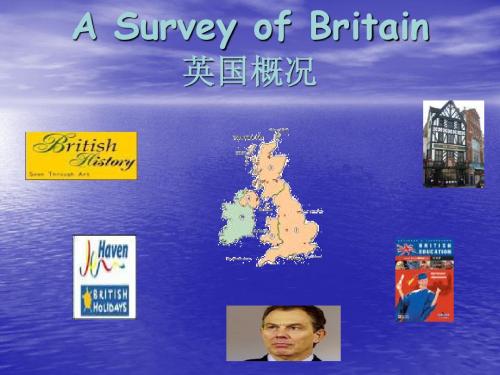
•
•
The Union Flag / Jack
• England's Flag.
England is represented by the flag of St. George . It is called the "St Georges Flag"
• Scotland's Flag.
Scotland is represented by the flag of St. Andrew . It is called the "St Andrews Flag".
为了帮助保护您的隐私, PowerPoint 禁止自动下载此外部图片。若要下载并显示此图片,请单击消息栏中的 “选项 ”,然后单击“ 启用外部内容 ”。
为了帮助保护您的隐私, PowerPoint 禁止自动下载此外部图片。若要下载并显 示此图片,请单击消息栏中的 “选项” ,然后单击“启用外部内容 ”。
Tower Bridge
伦
敦 塔
桥
Capital— Capital—London
伦 敦 大 本 钟 British Museum 大英博物馆的圆形阅览室 Big Ben
Capital— Capital—London
House of Parliament
议会大楼
National Anthem
• God save our gracious Queen!
•
National Flag --the Union Flag/ Jack --the
• Correct Way
• Upside Down!
• On the side next to the flagpole, (the hoist flagpole,
大学英语四级改革适用(听力)模拟试卷311
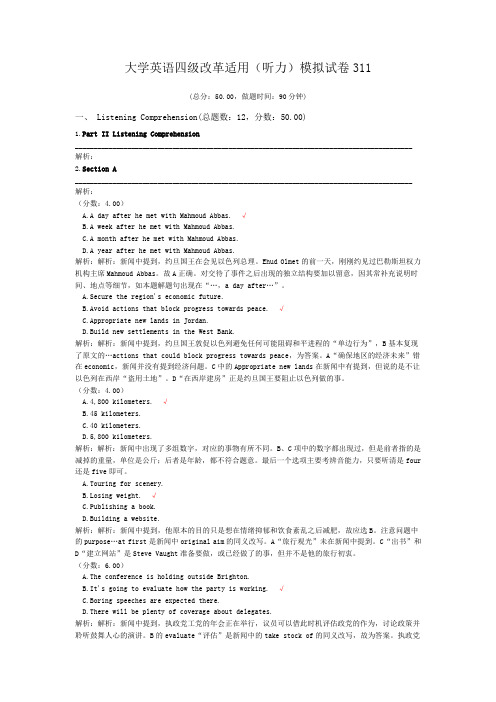
大学英语四级改革适用(听力)模拟试卷311(总分:50.00,做题时间:90分钟)一、 Listening Comprehension(总题数:12,分数:50.00)1.Part II Listening Comprehension__________________________________________________________________________________________ 解析:2.Section A__________________________________________________________________________________________ 解析:(分数:4.00)A.A day after he met with Mahmoud Abbas. √B.A week after he met with Mahmoud Abbas.C.A month after he met with Mahmoud Abbas.D.A year after he met with Mahmoud Abbas.解析:解析:新闻中提到,约旦国王在会见以色列总理。
Ehud Olmet的前一天,刚刚约见过巴勒斯坦权力机构主席Mahmoud Abbas。
故A正确。
对交待了事件之后出现的独立结构要加以留意,因其常补充说明时间、地点等细节,如本题解题句出现在“…,a day after…”。
A.Secure the region's economic future.B.Avoid actions that block progress towards peace. √C.Appropriate new lands in Jordan.D.Build new settlements in the West Bank.解析:解析:新闻中提到,约旦国王敦促以色列避免任何可能阻碍和平进程的“单边行为”,B基本复现了原文的…actions that could block progress towards peace,为答案。
- 1、下载文档前请自行甄别文档内容的完整性,平台不提供额外的编辑、内容补充、找答案等附加服务。
- 2、"仅部分预览"的文档,不可在线预览部分如存在完整性等问题,可反馈申请退款(可完整预览的文档不适用该条件!)。
- 3、如文档侵犯您的权益,请联系客服反馈,我们会尽快为您处理(人工客服工作时间:9:00-18:30)。
[ A Survey of Britain1. the full name of Britain, the nickname2. the location of Britain, the neighboring countries(France, The Republic of Ireland, the Netherlands, Belgium)3. the four sections of Britain, the four capital cities of the four sections4. the languages of Britain5. the geographical features of Britain6. the Lake District, the Pennines(The backbone of England), three natural zones of Scotland, the highest mountain, the longest river, the most important rivers in England and Scotland, the largest lake,7. the climate of Britain: maritime8. the early settlers: the Iberians(the earliest), the Beaker Folks, the Celts(three waves)9. the Roman Occupation (the recorded history begins), Julius Cae ser’s invasions (55, 54 BC), the conquest of Emperor Claudius I(AD43), the Hadrian’s Wall10. the Anglo-Saxons Times: three Germanic tribes, the Heptarchy, King Egbert(the first national king), Beowulf, King Arthur11. the English are the Anglo-Saxons, while the Scots, Welsh and Irish are the Celts.12. the Danish Rule(1017-1042): the Vikings and King Alfred (the father of theBritish Navy)13. the Norman Conquest: 1066, William the Conqueror, the battle of Hastings, theconsequences (the feudal system, a strong monarchy, the relationship with the church, the French language), Domesday Book,the great work of Middle English (the Canterbury Tales)14. Henry II’s legal reform15. King John and the Great Charter (1215), the nature of the Great Charter16. Henry III and the origin of Parliament: Simon de Monfort, All Estates Parliament(1265), Model Parliament (1295)17. Five events cause the feudal system to decline: the Hundred Years’ War(1337-1453), the Black Death (1348-1349), the Religious Reform of the 14thcentury, Wat Tyler’s Revolt (1381), the War of Roses (1455-1485)18. Religion: the three main religions of the world, the three main groups ofChristianity, St. Augustine and the conversion of Christianity of England (the 6th century)19. the present sovereign, the heir, the head of the state, the Prime Minister20. the form of the government(constitutional monarchy), the parliament (the Crown,the House of Lords, the House of Commons), the government(the Cabinet, the Privy Council), a two-party system (the Conservative and the Labor)Questions1. What do you know about the Roman influence on Britain?The Roman occupation lasted for almost 350 years, but the Roman influence on Britain was surprisingly limited. In the southern part, the Romans influenced life and culture radically. The English upper classes were thoroughly romanized and transformed into Roman landlords and officials. In the end, the Romans left behind themselves only three things of value: Christianity, the Roman roads and cities ,esp. London.2. How did the Heptarchy come into being during Anglo-Saxon times?The three Germanic tribes came to England in the middle of the 5th century.They combined all the qualities that were necessary to develop and defend an independent island. Before long the distinctions between these three tribes lost significance, and by the end of the 7th century they regarded themselves as “the nation of the English”. But they lacked unity and England was divided into a number of kingdoms and therefore called the “Heptarchy”.3. What were the consequences of the Norman Conquest?The Norman conquest caused important consequences:1) It increased the process of feudalism which had begun during Anglo-Saxon times. By the early part of 12the century, the manor system had replaced the village system completely, and feudalism was finally established in England.2) William the Conqueror established a strong monarchy in England. The feudal system of England acquired a more centralized character than in other European countries of the time.3) It brought about changes in the church.4) Along with the Normans came the French language, which would be the language of the court and upper classes until the 14th century.4. Why and how did the English Parliament come into being?The English Parliament originated in the Great Council, an advisory assembly of the king’s chief feudal vassals, including the clergy. The main purpose of the king’s summoning parliament was to get consent for taxation. The king, Henry III wanted to defeat the lords and their charter. He took some measures, such as dismissing his justiciar, etc. So the baron rose up in opposition. Led by Simon de Monfort, the King’s brother-in-law, they forced the king to dismiss his foreign advisers and accept their own council of advisers instead. In 1264 Monfort defeated the royal army and took the king prisoner. In the following year he called Parliament. The Parliament of 1265 is generally considered “the beginning of parliament”.Question Patterns of the Test PaperI. Multiple Choice (1%×20 =20%) II. Matching (2%×10 =20%) III. Blank Filling (18%) IV. Translation (18%)A. Translate the following terms into Chinese. (2%× 6=12%)B. Translate the following sentences into Chinese. (6%) V. Questions (24%)。
